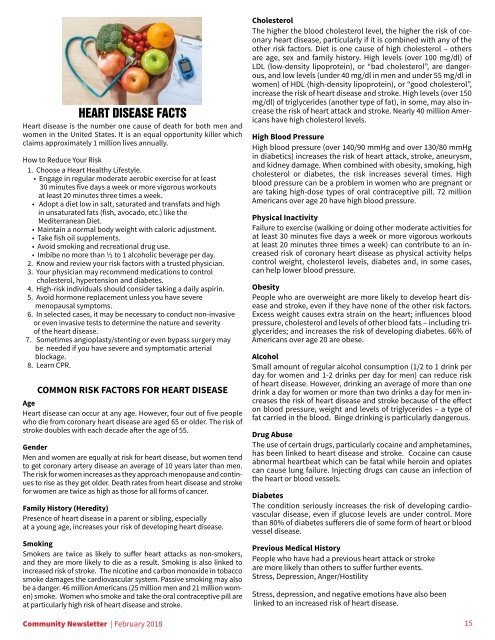Villages at Lakepointe February 2018
Create successful ePaper yourself
Turn your PDF publications into a flip-book with our unique Google optimized e-Paper software.
HEART DISEASE FACTS<br />
Heart disease is the number one cause of de<strong>at</strong>h for both men and<br />
women in the United St<strong>at</strong>es. It is an equal opportunity killer which<br />
claims approxim<strong>at</strong>ely 1 million lives annually.<br />
How to Reduce Your Risk<br />
1. Choose a Heart Healthy Lifestyle.<br />
• Engage in regular moder<strong>at</strong>e aerobic exercise for <strong>at</strong> least<br />
30 minutes five days a week or more vigorous workouts<br />
<strong>at</strong> least 20 minutes three times a week.<br />
• Adopt a diet low in salt, s<strong>at</strong>ur<strong>at</strong>ed and transf<strong>at</strong>s and high<br />
in uns<strong>at</strong>ur<strong>at</strong>ed f<strong>at</strong>s (fish, avocado, etc.) like the<br />
Mediterranean Diet.<br />
• Maintain a normal body weight with caloric adjustment.<br />
• Take fish oil supplements.<br />
• Avoid smoking and recre<strong>at</strong>ional drug use.<br />
• Imbibe no more than ½ to 1 alcoholic beverage per day.<br />
2. Know and review your risk factors with a trusted physician.<br />
3. Your physician may recommend medic<strong>at</strong>ions to control<br />
cholesterol, hypertension and diabetes.<br />
4. High-risk individuals should consider taking a daily aspirin.<br />
5. Avoid hormone replacement unless you have severe<br />
menopausal symptoms.<br />
6. In selected cases, it may be necessary to conduct non-invasive<br />
or even invasive tests to determine the n<strong>at</strong>ure and severity<br />
of the heart disease.<br />
7. Sometimes angioplasty/stenting or even bypass surgery may<br />
be needed if you have severe and symptom<strong>at</strong>ic arterial<br />
blockage.<br />
8. Learn CPR.<br />
COMMON RISK FACTORS FOR HEART DISEASE<br />
Age<br />
Heart disease can occur <strong>at</strong> any age. However, four out of five people<br />
who die from coronary heart disease are aged 65 or older. The risk of<br />
stroke doubles with each decade after the age of 55.<br />
Gender<br />
Men and women are equally <strong>at</strong> risk for heart disease, but women tend<br />
to get coronary artery disease an average of 10 years l<strong>at</strong>er than men.<br />
The risk for women increases as they approach menopause and continues<br />
to rise as they get older. De<strong>at</strong>h r<strong>at</strong>es from heart disease and stroke<br />
for women are twice as high as those for all forms of cancer.<br />
Family History (Heredity)<br />
Presence of heart disease in a parent or sibling, especially<br />
<strong>at</strong> a young age, increases your risk of developing heart disease.<br />
Smoking<br />
Smokers are twice as likely to suffer heart <strong>at</strong>tacks as non-smokers,<br />
and they are more likely to die as a result. Smoking is also linked to<br />
increased risk of stroke. The nicotine and carbon monoxide in tobacco<br />
smoke damages the cardiovascular system. Passive smoking may also<br />
be a danger. 46 million Americans (25 million men and 21 million women)<br />
smoke. Women who smoke and take the oral contraceptive pill are<br />
<strong>at</strong> particularly high risk of heart disease and stroke.<br />
Community Newsletter | <strong>February</strong> <strong>2018</strong><br />
Cholesterol<br />
The higher the blood cholesterol level, the higher the risk of coronary<br />
heart disease, particularly if it is combined with any of the<br />
other risk factors. Diet is one cause of high cholesterol – others<br />
are age, sex and family history. High levels (over 100 mg/dl) of<br />
LDL (low-density lipoprotein), or “bad cholesterol”, are dangerous,<br />
and low levels (under 40 mg/dl in men and under 55 mg/dl in<br />
women) of HDL (high-density lipoprotein), or “good cholesterol”,<br />
increase the risk of heart disease and stroke. High levels (over 150<br />
mg/dl) of triglycerides (another type of f<strong>at</strong>), in some, may also increase<br />
the risk of heart <strong>at</strong>tack and stroke. Nearly 40 million Americans<br />
have high cholesterol levels.<br />
High Blood Pressure<br />
High blood pressure (over 140/90 mmHg and over 130/80 mmHg<br />
in diabetics) increases the risk of heart <strong>at</strong>tack, stroke, aneurysm,<br />
and kidney damage. When combined with obesity, smoking, high<br />
cholesterol or diabetes, the risk increases several times. High<br />
blood pressure can be a problem in women who are pregnant or<br />
are taking high-dose types of oral contraceptive pill. 72 million<br />
Americans over age 20 have high blood pressure.<br />
Physical Inactivity<br />
Failure to exercise (walking or doing other moder<strong>at</strong>e activities for<br />
<strong>at</strong> least 30 minutes five days a week or more vigorous workouts<br />
<strong>at</strong> least 20 minutes three times a week) can contribute to an increased<br />
risk of coronary heart disease as physical activity helps<br />
control weight, cholesterol levels, diabetes and, in some cases,<br />
can help lower blood pressure.<br />
Obesity<br />
People who are overweight are more likely to develop heart disease<br />
and stroke, even if they have none of the other risk factors.<br />
Excess weight causes extra strain on the heart; influences blood<br />
pressure, cholesterol and levels of other blood f<strong>at</strong>s – including triglycerides;<br />
and increases the risk of developing diabetes. 66% of<br />
Americans over age 20 are obese.<br />
Alcohol<br />
Small amount of regular alcohol consumption (1/2 to 1 drink per<br />
day for women and 1-2 drinks per day for men) can reduce risk<br />
of heart disease. However, drinking an average of more than one<br />
drink a day for women or more than two drinks a day for men increases<br />
the risk of heart disease and stroke because of the effect<br />
on blood pressure, weight and levels of triglycerides – a type of<br />
f<strong>at</strong> carried in the blood. Binge drinking is particularly dangerous.<br />
Drug Abuse<br />
The use of certain drugs, particularly cocaine and amphetamines,<br />
has been linked to heart disease and stroke. Cocaine can cause<br />
abnormal heartbe<strong>at</strong> which can be f<strong>at</strong>al while heroin and opi<strong>at</strong>es<br />
can cause lung failure. Injecting drugs can cause an infection of<br />
the heart or blood vessels.<br />
Diabetes<br />
The condition seriously increases the risk of developing cardiovascular<br />
disease, even if glucose levels are under control. More<br />
than 80% of diabetes sufferers die of some form of heart or blood<br />
vessel disease.<br />
Previous Medical History<br />
People who have had a previous heart <strong>at</strong>tack or stroke<br />
are more likely than others to suffer further events.<br />
Stress, Depression, Anger/Hostility<br />
Stress, depression, and neg<strong>at</strong>ive emotions have also been<br />
linked to an increased risk of heart disease.<br />
15

















